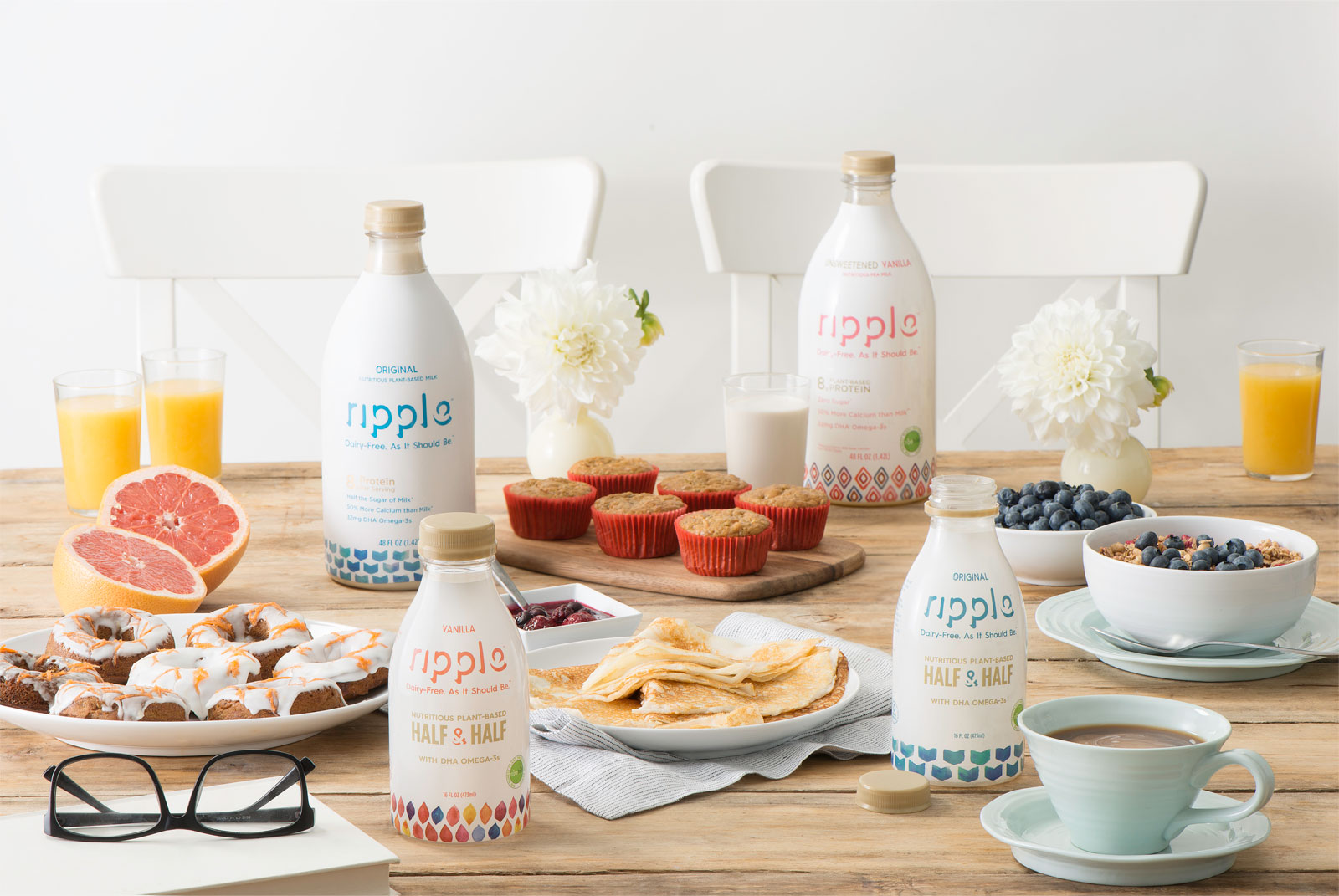It’s been called the Trend of the Year for 2018 by restaurant consultant Baum + Whiteman, as plant-based foods capture increasing supermarket shelf space and infiltrate mainstream eating habits. Last year saw an 8.1 percent growth in the sector, compared to a loss of 0.2 percent for all foods sold; the non-dairy milk sector grew 3.1 percent, while cow’s milk sales were down 5 percent. About 31 percent of Americans practice meat-free days. Plant-based milk is projected to top $16.3 billion in 2018, reaching $19.5 billion by 2020.
While the trend is particularly strong among Millennials and Gen Xers, more “flexitarians” are consuming alternatives while continuing to eat meat and dairy—primarily because plant-based foods are becoming tastier. “We’ve seen a sea change [in buying habits] this last year,” said a representative of nut milk producer Califia Farms. “It takes strong brands to lead the way in that.”
Trend goes mainstream, attracts food giants
Who are these manufacturing game-shifters? Beyond Meat, Daiya, Tofurky, Field Roast, and Ripple Foods, to name a few. Two key factors are driving the trend. First, consumers want healthier, more sustainable food choices; and second, these plant-based alternatives offer familiar textures with great taste, partly due to advances in food technology.
Founder and CEO David Lee of Field Roast Grain Meat Co., has a slightly different take in an interview with FoodNavigator USA: “Food isn’t a place where people want to get dazzled by tech. It’s about being less processed, simpler, artisan, handmade.”
Food giants are aggressively backing the trend: Nestle bought Sweet Earth, Campbell’s purchased Pacific Foods, Tyson Foods (along with Bill Gates and actor Leonardo DiCaprio) has invested in Beyond Meat. Goldman Sachs contributed to a $65 million investment in Ripple Foods, which makes plant-based milks from yellow peas.
Plant-rich for planet health
But there’s more at stake here than corporate profits and creative food innovations—a “plant-rich” diet ranks #4 in Paul Hawken’s book Drawdown, highlighting the 100 most substantive and realistic solutions to address climate change. Meat-centric diets account for one-fifth of global emissions. Drawdown predicts “available, visible, and enticing” plant foods, including high-quality meat substitutes, could reduce carbon dioxide by 66.11 gigatons by 2050.
One company using technology to make a plant-based milk with a small carbon footprint is Ripple Foods—on a mission to create foods “delicious above all else.” Co-founders Adam Lowry and Neil Renninger built on Lowry’s success with Method Products (natural cleaning products) and Renninger’s biochemical engineering and product development expertise. Wanting to make the biggest impact, they focused on dairy, which comprises one-quarter of food’s carbon emissions. Using a natural method to extract the pure protein from dried yellow peas (removing impurities through temperature and separation), they created a flavorless protein called Ripptein, to echo the company name.
Ripple sells five varieties of milk that match cow’s milk in protein content (8 g per serving), with one-half the sugar and 50 percent more calcium.
“They’re creamy and delicious, not thin or chalky like some plant-based milks …taste and protein are our key selling points, with the environmental benefits built-in,” Lowry said. One 48-oz bottle saves 3.5 lbs. carbon dioxide and 925 gallons of water, versus dairy milk.
Ripple also makes half and half and a yogurt alternative. The milks go for nearly $5 for a 48-oz bottle; they are found in Whole Foods (sales grew 300 percent after the first product landed in 2016), Target, Kroger, and many regional grocers. Adam says prices will come down as scale goes up.
“Our approach is different from the typical ‘here’s a green product, healthier, you should eat it’—we create food that tastes great, and that happens to have great sustainability impacts.”
The products are Non-GMO Project Verified because consumers are looking for that reassurance, Lowry said.
“Days of animal foods as nutritional standard are over”
Ironically, mock meats, fermented cheese products, bleeding veg burgers and pea milks are actually “processed” foods, some would say “high-tech”…but the concentration on fresh veggies, fruits, and grains in plant-rich meals may balance that out. As Adam points out, meat and dairy are both highly processed industries, not to mention the plethora of processed products many people consume regularly.
“The days of animal foods as the nutritional standard are over,” Lee said. “Plant based foods are not just about milk and meat but grains, veggies, legumes, kale, quinoa, nuts, the whole diet.” He predicts that plant-based meats will soon join the meat aisle in stores, as plant-based milks are now appearing in the dairy aisle —and in 15-20 years “there will just be a protein section.”
It’s an exciting time to be a consumer of food—that essential activity becomes a reflection of our values, nutritional awareness, environmental conscience, and political choices. So go out and enjoy the panoply of delectable, nutritious options appearing nearly daily, each with its story and attractions.





